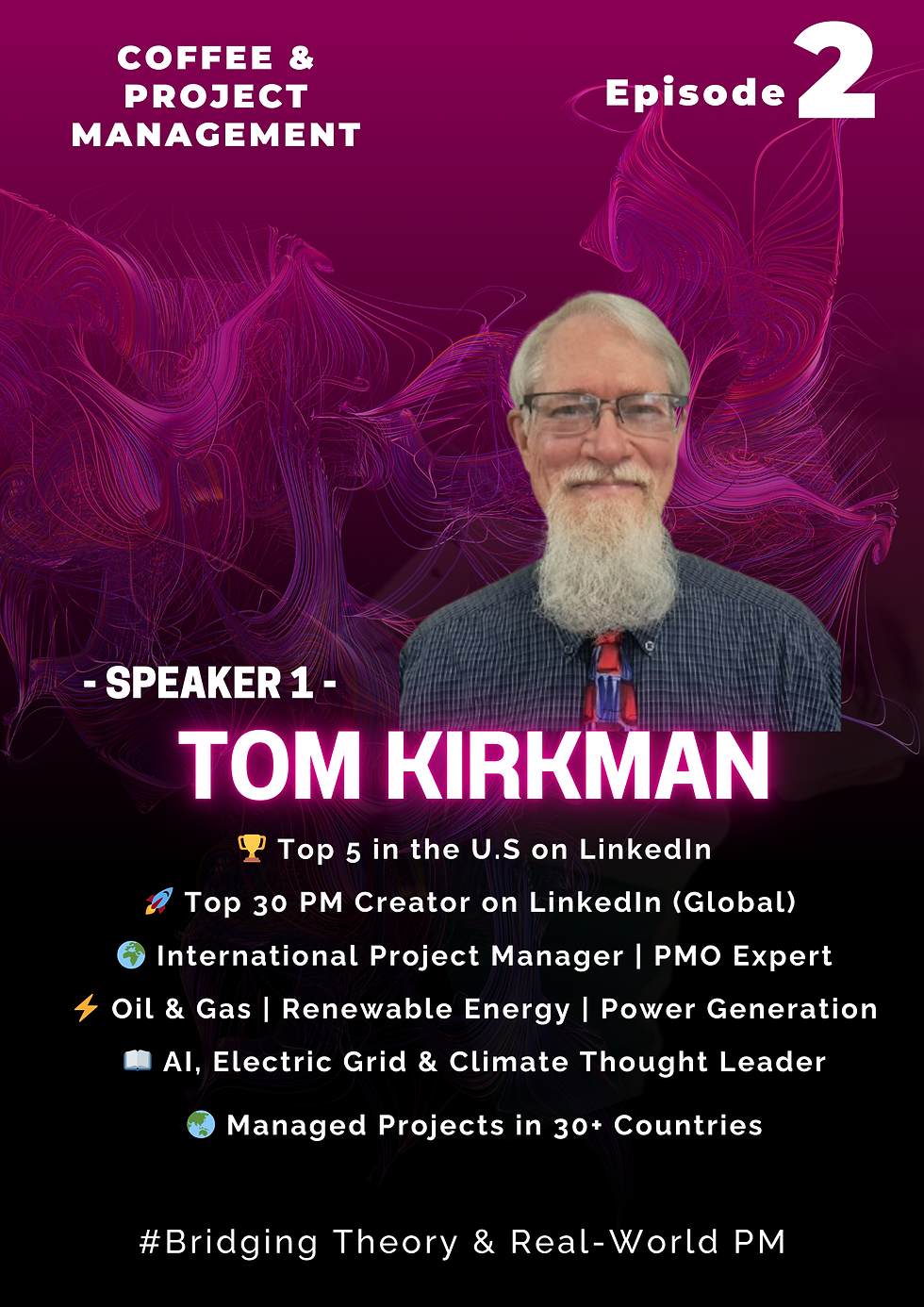Real-World Project Management: Lessons from Tom Kirkman
- Bhavana Tadiboina
- Feb 27, 2025
- 4 min read
Many of us enter project management by following a structured path—getting a master’s degree, reading the PMBOK, and earning certifications. But as I spoke with Tom Kirkman, an international project manager with experience across 30+ countries, it became clear that real-world project management is far messier, more people-driven, and much less about following a manual.
Tom doesn’t hold back. His insights on communication, leadership, problem-solving, and the reality of managing large-scale projects are a must-read for every aspiring PM. If you want to understand what it truly takes to succeed in project management, keep reading.

🎯 1. The Truth About Project Management: It’s About People, Not Projects
📌 “There’s no such thing as a smoothly running project. If projects ran themselves, we wouldn’t need project managers.”
One of the biggest myths in project management is that it’s about processes and tools. While those matter, the real challenge lies in managing people—clients, teams, stakeholders, and executives—who all have their own agendas, priorities, and biases.
🔹 Projects don’t fail because of bad templates or frameworks—they fail because of poor communication, misaligned expectations, and hidden roadblocks.
🔹 Project managers deal with people's problems. Engineers fix mechanical problems; PMs fix human ones.
🔹 You can’t solve a problem unless you call it what it is. Stop calling problems “challenges” or “issues”—define them properly and deal with them.
💡Takeaway: Learn how to navigate people dynamics, politics, and difficult conversations. That’s what separates a great PM from an average one.
💬 2. "Everything Is Fine" Is the Biggest Red Flag 🚩
📌 “If someone tells me everything is fine, I don’t believe them. That’s not how real life works.”
Tom shared how he never trusts a project report that says everything is “on track.” The reality? Something is always behind schedule, over budget, or at risk. If problems aren’t being raised, it means they’re being hidden.
🔸 A project manager’s job is to dig for the truth, not to accept surface-level answers.
🔸 Good PMs don’t wait for problems to explode—they anticipate and address them early.
🔸 If you only rely on reports without going to the site, you’re operating blind.
💡 Takeaway: Ask more questions, double-check updates, and trust but verify. The sooner you spot issues, the easier they are to fix.
📍 3. Why Remote Project Management Doesn’t Work (Most of the Time)
📌 “You cannot manage a project remotely. You need to be on-site to see what’s really happening.”
While many PMs believe they can run a project effectively from behind a screen, Tom strongly disagrees. He believes that without in-person interaction, you’re only seeing a filtered version of reality.
✅ Being on-site lets you talk to workers, observe operations, and spot inefficiencies before they escalate.
✅ Body language, eye contact, and informal chats reveal more than emails and reports ever will.
✅ If your entire project update comes from a Zoom call, you’re missing critical insights.
🔹 Yes, some industries allow remote management, but for high-stakes projects, on-site presence is key.
💡 Takeaway: If you’re serious about understanding what’s happening in a project, go see it for yourself. Reports can lie—reality doesn’t.

📚 4. How to Balance Technical Knowledge & Leadership Skills
📌 “Project managers don’t need to be experts, but they need to ask the right questions.”
Tom has worked across multiple industries—oil & gas, electric utilities, energy, and engineering. He never starts as the most technically skilled person in the room, but he quickly gets up to speed by learning the industry’s language.
🔸 The best way to learn? Start an acronym and glossary list. Every industry has its own jargon, and if you don’t understand it, you’ll struggle to make good decisions.
🔸 Talk to engineers, developers, and experts on your team. Let them teach you the technical details.
🔸 Focus on clear communication—turn complex technical data into simple, actionable insights.
💡 Takeaway: PMs don’t need to be engineers, but they must understand enough to ask smart questions. Knowledge is power—but clarity is king.
🛠 5. Keeping Projects Organized: The 3-Question Weekly Report
📌 “Project reports should be simple. If they get too long, they’re full of fluff.”
Tom believes that overcomplicated reporting wastes time and hides real problems. His advice? Every project update should answer just three questions:
1️⃣ What did we accomplish last week?
2️⃣ What are we working on this week?
3️⃣ What’s planned for next week?
That’s it. No unnecessary jargon, no hiding bad news—just clarity.
🔹 If reports sound too polished, there’s probably something being covered up.
🔹 Bad news should be flagged early, not hidden to “look good” in front of leadership.
🔹 Your job is to provide real insights, not corporate fluff.
💡 Takeaway: Keep reports short, clear, and brutally honest.
🚀 Final Thoughts: What Aspiring PMs Must Remember
Tom Kirkman’s perspective is raw, real, and incredibly valuable. If you’re a student or aspiring PM, here’s what you need to take away:
✅ Project management is about people, not processes.
✅ If no one’s raising problems, they’re being hidden.
✅ Remote PM is risky—go see the project in action.
✅ You don’t need to be an expert, but you need to ask the right questions.
✅ Simplify updates—clarity beats complexity.
The more I spoke with Tom, the more I realized how different real-world project management is from what we’re taught in school. Certifications, textbooks, and frameworks are just the beginning—the real learning happens when you step into the field and manage people.
💬 What’s the biggest lesson you’ve learned in project management so far? Let’s discuss!



Comments